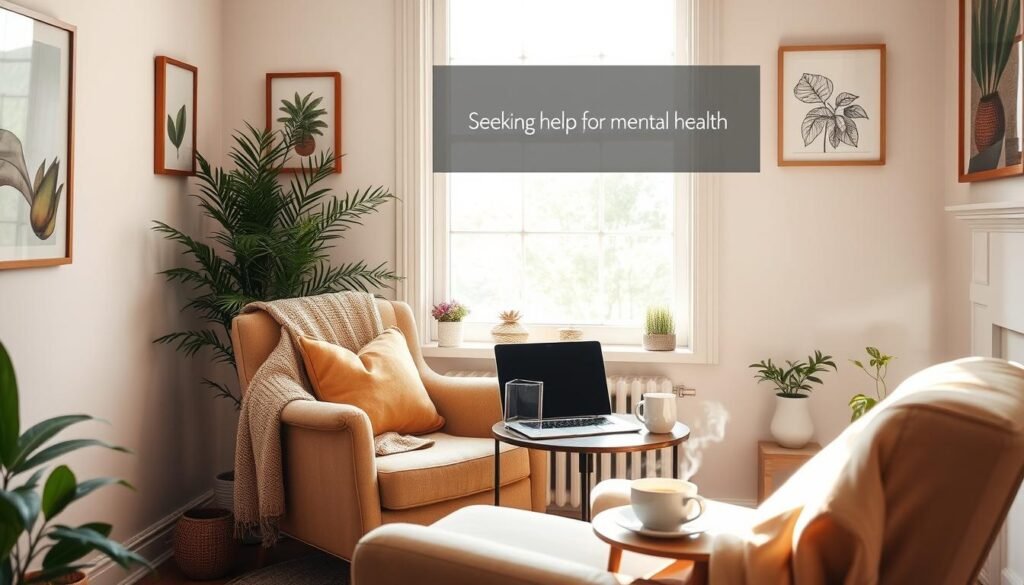Did you know nearly one-third of U.S. adults felt depressed by October 2021? That’s a jump from 8.5% before the pandemic. This shows we need better access to mental health help. Luckily, online depression treatment offers expert care without leaving your house.
The rise of digital support has changed how we see mental health care. Through teletherapy for depression, people get personal plans from licensed experts. With apps and online counseling, help is easier to find than ever.
Online therapy helps people deal with today’s complex world. It offers more than ease; it really improves mental health. To see how it works for depression, check Talkiatry’s online platform. There, you’ll find full evaluations and custom treatment plans.
Key Takeaways
- Online resources for depression give easy and quick support.
- Teletherapy is just as good as seeing someone in person.
- Studies say online therapy really cuts down on symptoms when used regularly.
- Working together on treatment plans can make them work better.
- Digital tools are key in making mental health care better.
Understanding Depression
Understanding depression is key to knowing its deep effect on people. It can catch anyone, no matter their age or where they come from. Unlike short moments of sadness, clinical depression sticks around, making everyday life hard. Its symptoms are there most of the day and last for over two weeks, making it different from just feeling sad.
Clinical depression has many types, like major depression, persistent depressive disorder, and seasonal affective disorder. Major depression means having five or more serious symptoms, such as feeling very sad or losing interest in fun activities. Persistent depressive disorder, or dysthymia, lasts for at least two years. Sometimes, it happens along with episodes of major depression. It’s important to know these differences to manage and treat them well.
The way depression feels can be different for everyone. Some may feel sad or worried all the time, while others might eat more or less, or sleep too much or too little. It can even cause physical problems, making the emotional pain worse. By understanding depression, we can lessen the shame around it and help people find the support they need. Treatment usually involves talking to a therapist and may include medicine, depending on the person.
To learn more about this important issue, check out detailed resources. These discuss the different types of depression and how to handle them. Starting the journey to healing can be tough, but knowing more about depression brings hope. It pushes people to take active steps towards getting better.
Signs and Symptoms of Depression
Knowing how to spot depression is key to getting help early. People with depression face many challenges that affect their everyday life. Some common signs are persistent sadness, sleeping too much or too little, feeling very tired, getting easily upset, feeling worthless, and having a hard time focusing. These problems usually stick around for at least two weeks, hurting someone’s work and personal life.
Depression is more common than you might think. One in six people will go through a major bout of depression in their lifetime. Currently, 18% of adults are battling depression, and almost 29% have been diagnosed at some point. Knowing what to look out for helps people and their loved ones find the right kind of help, like therapy or online resources.
Depression seriously affects how you live your life. Making positive changes, like better sleep and exercise, can help you start to feel better. Taking antidepressants or doing cognitive behavioral therapy (CBT) can also make a big difference. They work by changing negative thoughts and teaching better ways to cope.
Doctors diagnose depression with a mix of exams, tests, and talking about your feelings. Getting the right treatment early can help most people improve, showing why it’s important to know the early signs and ask for professional help.
| Symptom | Description |
|---|---|
| Persistent Sadness | Ongoing feelings of sadness that do not seem to subside. |
| Fatigue | Feeling tired even after sufficient rest. |
| Irritability | Increased feelings of frustration and annoyance. |
| Feelings of Worthlessness | A pervasive sense of inadequacy or failure. |
| Difficulties Concentrating | Struggling to focus on tasks or make decisions. |
| Changes in Sleep Patterns | Experiencing insomnia or hypersomnia. |
What Causes Depression?
The causes of depression are many and not simple. Some people are more likely to get depressed because of their genes. If depression runs in the family, they have a higher risk. Changes in the body, like hormone levels or brain chemicals, play a big role too.

Things around us can make depression start. Losing someone close or too much pressure at work can trigger it. Living in tough situations, like being poor or facing abuse, also increases the risk.
Using drugs or alcohol a lot is another big factor. People with these problems often get really sad and depressed. It shows why we must look at all mental health factors together when we think about someone’s health.
To fight depression effectively, we need to know all its causes. Plans to help someone should include looking at their genes and what’s happening in their life. This way, we can address the problem from all sides.
| Factor | Description |
|---|---|
| Genetic Predisposition | Family history increases the risk of developing depression. |
| Biological Factors | Neurotransmitter imbalances can lead to depressive symptoms. |
| Environmental Triggers | Stressful life events and ongoing hardship can prompt depression. |
| Substance Abuse | Increases the likelihood of experiencing depression. |
The Importance of Seeking Help
It’s crucial to seek help if you’re feeling depressed. Many people are scared or ashamed to look for treatment. But knowing that depression can be treated encourages them to get the help they need. Using online therapy lets you talk about your thoughts and feelings in a safe space.
It’s important to recognize signs of mental health issues. These can include feeling very sad, getting annoyed easily, and having trouble focusing. Dealing with these can be hard. That’s why it’s so important to get help from a professional. Getting support early can lead to a better diagnosis and treatment.

Online therapy helps overcome challenges in getting help. It’s flexible and private since you can use it from home. But more studies are needed to fully understand its benefits. Still, it seems to be making it easier for people to seek help.
Getting help is key and should not be done alone. Taking steps to find support can change your life for the better. Support of any kind can have a big impact. Choosing online therapy can be a hopeful step for those looking to improve their mental health.
What is Online Depression Treatment?
Online depression treatment provides mental health help via the internet. It helps people with depression from their homes. This helps avoid problems like travel or busy schedules. Services like teletherapy and virtual counseling are popular.
Teletherapy uses video calls to connect therapists and patients. It allows for real-time help. Virtual counseling uses chat or email for those who prefer writing. It’s great for those nervous about meeting in person.
There are also apps and e-solutions for managing depression. These help track symptoms and improve wellbeing. They use therapies like cognitive-behavioral therapy (CBT), just like in-person sessions.
Online treatments make it easier to get mental health care. They have led to more people seeking help. Being anonymous can make it easier for some to reach out. Also, they are often cheaper than meeting a therapist in person.

Benefits of Online Therapy for Depression
Online therapy lets people find mental health help without leaving home. It’s valuable for those who prefer not to or can’t attend traditional therapy. This method offers therapy beyond the usual limits, making it crucial for many.
Accessibility and Convenience
One big perk of online therapy is how easy it is to get. People can pick session times that fit their schedule, avoiding travel hassle. This is especially good for those living far from cities or those who have trouble moving around. Because of this, more folks can get the help they need, when they might not have before.
Cost-Effectiveness Compared to Traditional Therapy
Online therapy is also more budget-friendly. Many websites offer rates better than what you’d usually pay. Without the need to travel, saving money is easier. This means you can get therapy longer without spending more, while still receiving great care. Studies show online therapy works as well as meeting face-to-face, making it a smart money choice for many fighting depression.
| Feature | Online Therapy | Traditional Therapy |
|---|---|---|
| Accessibility | Available anywhere with internet | In-person visits required |
| Scheduling Flexibility | High flexibility for appointments | Rigid schedules |
| Cost | Generally lower fees | Higher fees with travel costs |
| Privacy | HIPAA compliant | In-person privacy issues |
| Therapist Availability | Wider accessibility to specialists | Limited to local professionals |
Effectiveness of Online Depression Treatment
The growth of online depression treatment is catching eyes. It’s known for boosting mental health. Effectiveness of online depression treatment shines through in research. Internet-delivered Cognitive Behavioral Therapy (iCBT) shows real promise. It offers significant perks for users. With digital help on the rise, it’s key for both doctors and patients to get the facts on teletherapy’s success.
Research Supporting Teletherapy for Depression
Research links iCBT with better life quality in adults facing major depressive disorder. A deep dive into seventeen articles showed iCBT cuts down depression big time. The Beck Depression Inventory was used for this, netting a Cohen’s d of .64. Who sees the most benefit? Younger women and those dealing with other health problems, actually.
Patient Outcomes vs. In-Person Therapy
Online and in-person therapy outcomes can be quite similar. One study had 55% of folks checking back in after treatment. They reported lasting perks six months later. A whopping 80% felt the program truly helped. iCBT stands out for its custom care. It molds to what each person needs. This makes patients more involved and boosts success rates. It’s also a solid pick when traditional therapy isn’t an option. To learn more about when to seek professional depression help, check this resource.
| Study Metrics | Results |
|---|---|
| Reduction in Depression Severity | Cohen’s d: .64 (CI 95% = 0.33 – 0.94) |
| Improvement in Social Functioning | Cohen’s d: .64 (CI 95% = 0.33 – 0.95) |
| Completion Rate | 55% post-measurement after 9 weeks |
| Sustained Improvement | Maintained effects at 6-month follow-up |
| Subjective Helpfulness | Over 80% reported the program was helpful |
Types of Online Depression Treatment Options
Online therapy is changing how people get help for depression. There are many different services available. They make getting care easy and convenient. Teletherapy, e-mental health programs, and app-based tools are among the top choices. Each one is designed to meet the different needs and situations of users.
Teletherapy and Virtual Counseling
Teletherapy lets people talk to therapists via video or phone. It feels like a regular therapy session but you can stay at home. Virtual counseling might also let you text your therapist when convenient. This flexibility helps those who find it hard to visit therapists in person.
For deeper health checks, trained specialists use online platforms for support and diagnosis. They provide evidence-based help as featured on Mayo Clinic. These platforms are great for getting guidance, support, and referrals online.
e-Mental Health Solutions
e-Mental health programs offer courses based on cognitive-behavioral therapy (CBT). Users can tackle these at their own pace, sometimes with a therapist’s help over the phone. These resources give personalized coping strategies and support. It makes learning and getting better more manageable for users.
App-Based Depression Management Tools
Depression management apps allow you to handle feelings anytime, anywhere. These apps provide mood trackers and guided meditations. They help you understand your emotion patterns and triggers. As their use grows, they serve as a vital supplement to other treatments. They attend to various mental health needs, making comprehensive support accessible. For insights into overcoming mental health stigma, Immune Vitality has valuable information.